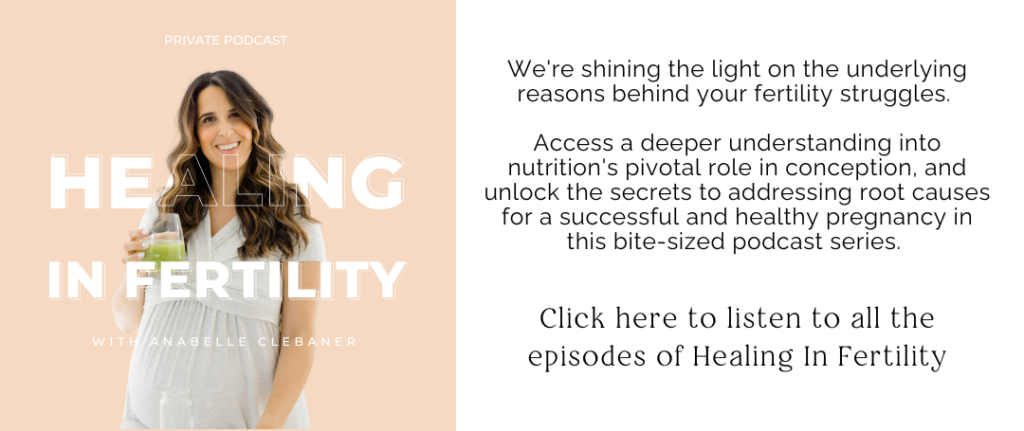Fertility
Resources
Style
Planning
View All
Polycystic Ovary Syndrome (PCOS) affects millions of women worldwide, often making the journey to conception a challenging one. If you’re navigating the complexities of PCOS, understanding the role of insulin resistance is crucial not just for managing symptoms but also for enhancing your fertility naturally. This comprehensive guide aims to illuminate the connection between PCOS and insulin resistance, offering practical dietary and lifestyle tips to help you take control of your health.
A journey of a thousand miles begins with a single step. Let’s start with understanding how insulin resistance impacts PCOS.
- Types of PCOS
- What is Insulin Resistance?
- Causes of Insulin Resistance in PCOS
- Symptoms of Insulin Resistance
- Dietary Tips for Managing Insulin Resistance
- Which Labs to Request when you have PCOS
- Conclusion
Types of PCOS
There are four different types of PCOS. Each type comes with its own set of challenges and requires tailored management strategies.
- Insulin-Resistant PCOS: This is the most common type and is characterized by significant insulin resistance, leading to high insulin levels. Managing this type involves focusing on improving insulin sensitivity through diet and lifestyle changes.
- Inflammatory PCOS: Women with this type often experience symptoms like unexplained fatigue, skin issues like eczema or psoriasis, and elevated levels of inflammation markers. Anti-inflammatory diets and stress management techniques can be particularly beneficial.
- Adrenal PCOS: This type is linked to an abnormal stress response, leading to elevated levels of DHEA-S, a hormone produced by the adrenal glands. Stress reduction techniques and targeted dietary changes are crucial for managing this type.
- Post-Pill PCOS: Some women experience PCOS-like symptoms after discontinuing birth control pills. This type often resolves on its own, but meanwhile, focusing on hormonal balance and liver health can help.
Understanding which type or combination of types of PCOS you have can significantly impact your fertility treatment plan. It’s essential to work with a healthcare provider to determine your specific type and develop a personalized strategy.
Okay, so let’s dive into the first one: insulin-resistant PCOS. Up to 70% of women with PCOS have insulin resistance, so this tends to be the one we focus on the most in our practice. But really, all women should be concerned with blood sugar management when trying to conceive.
What is insulin resistance?
Insulin resistance is a condition where your body’s cells become less responsive to the hormone insulin. This means that the glucose in your blood isn’t efficiently absorbed into your cells, leading to higher blood sugar levels. For women with PCOS, this can be particularly problematic, as insulin resistance can exacerbate many of the symptoms associated with the syndrome.

In simple terms, when you eat, your body breaks down carbohydrates into glucose, which is the main source of energy for your cells. Insulin, produced by the pancreas, helps transport this glucose into your cells. When you have insulin resistance, your cells don’t respond effectively to insulin, so your pancreas produces more insulin to compensate. This can lead to a myriad of issues, including weight gain and difficulty losing weight, two common problems associated with PCOS.
The relationship between PCOS and insulin resistance is complex. Though insulin resistance is commonly linked to obesity, it can also occur in women with PCOS who are lean. Research has shown that the mechanism of insulin resistance in PCOS differs from that seen in individuals with type 2 diabetes, suggesting unique cellular and receptor abnormalities.
It’s crucial to address insulin resistance not only to improve your fertility but also to reduce the risk of developing other long-term health issues like type 2 diabetes and cardiovascular diseases. Therefore, understanding and managing insulin resistance through diet, exercise, and possibly medications such as metformin is vital for anyone dealing with PCOS.
Causes of Insulin Resistance in PCOS:
This debilitating condition isn’t only limited to those struggling with weight issues; it affects lean women as well. Insulin resistance in PCOS involves a complex interplay between hormones and metabolic processes.
In many cases, the body’s cells become less responsive to insulin, forcing the pancreas to produce more of this hormone to compensate. This condition, known as compensatory hyperinsulinemia, exacerbates the hormonal imbalances already present in PCOS, contributing to an increase in androgen levels. Elevated androgens can lead to several of the symptoms associated with PCOS, such as irregular menstrual cycles, acne, and excessive hair growth.
Understanding the underlying causes and identifying symptoms can help you take targeted steps to manage them effectively. Research has shown that regardless of body mass index, the unique cellular mechanisms and insulin receptor functions in women with PCOS are inherently different.
It’s essential to recognize these differences to tailor appropriate lifestyle and dietary modifications that can help regain control over your insulin levels and improve your overall reproductive health. Taking proactive steps can make a significant difference in managing both PCOS and insulin resistance.
Symptoms of Insulin Resistance:
Recognizing the symptoms of insulin resistance can be a crucial step in managing PCOS effectively. Often, these symptoms overlap with those of PCOS, making it essential to pay close attention to your body and how it responds to different situations and dietary choices.
Common symptoms of insulin resistance include:
- Increased hunger and cravings, particularly for sugary or carbohydrate-rich foods
- Weight gain, especially around the abdomen, despite no significant changes in diet or lifestyle
- Fatigue or feeling overly tired, even after adequate rest
- Difficulty losing weight, even with diet and exercise efforts
- Dark, velvety patches of skin, often found on the neck, armpits, or groin area, known as acanthosis nigricans
- Frequent or increased need to urinate
- Increased thirst
If you notice these symptoms, it’s important to speak with your healthcare provider. Early diagnosis and management can help mitigate the risk of associated conditions, such as type 2 diabetes. Testing for insulin resistance typically involves blood tests to measure fasting blood glucose and insulin levels. Other tests, like the oral glucose tolerance test (OGTT), may also be utilized to get a comprehensive understanding of your body’s insulin response.
Understanding these symptoms and seeking timely medical advice can empower you to take control of your health and make informed decisions about your lifestyle and dietary choices.
Dietary Tips for Managing Insulin Resistance
In our private practice, we work with many women with PCOS. In fact PCOS is the leading cause of fertility struggles among women. 70-80% of women with PCOS experience infertility. Luckily, there are ways to manage PCOS and insulin resistance, and still go on to have a healthy pregnancy.
One of the cornerstones of managing PCOS and improving fertility is understanding and addressing insulin resistance. Insulin resistance plays a significant role in how PCOS affects your body, contributing to issues like weight gain, irregular menstrual cycles, and difficulty with ovulation. By focusing on lifestyle and dietary changes, you can effectively reduce insulin resistance and enhance your chances of conception.

Firstly, adopting a balanced diet rich in whole foods is crucial. Emphasize low glycemic index (GI) foods, which help manage blood sugar levels more effectively. Think whole grains, legumes, lean proteins, and plenty of vegetables. Incorporating these into your daily meals can stabilize insulin levels and support overall health. Dietary changes can improve insulin sensitivity by 25-30%
To further optimize your diet for managing insulin resistance, follow these specific tips:
- Balance Your Carbs: Avoid eating carbohydrates on their own. Pair them with proteins or healthy fats to slow down digestion and prevent sudden spikes in blood sugar levels. Low glycemic index diets can improve menstrual regularity in women with PCOS by 50%
- Protein Intake: Aim for 1 gram of protein per pound of body weight each day. Quality sources include lean meats, fish, eggs, dairy, and plant-based options like beans and lentils.
- Fiber-Rich Foods: Include plenty of fiber-rich foods in your diet, such as fruits, vegetables, whole grains, and legumes. Fiber helps regulate blood sugar levels and promotes a feeling of fullness, which can aid in weight management. Aim for 30-40g of fiber per day. Using an app to track your food can be helpful here!
Implementing these tips can promote better blood sugar control and overall health, making it easier to manage symptoms of PCOS and insulin resistance.
Regular physical activity is another essential component. Exercise not only aids in weight management but also improves insulin sensitivity. Aim for a combination of aerobic exercises like walking, swimming, or cycling, along with strength training to build muscle mass, which helps your body use insulin more efficiently. Regular physical activity can reduce insulin resistance by up to 60% – so it’s a good idea to find an activity you really enjoy doing!
Stress management techniques such as mindfulness, yoga, or meditation can also play a critical role. Chronic stress can exacerbate insulin resistance and disrupt your hormonal balance, so finding ways to relax and manage stress is vital.
Lastly, working closely with a healthcare provider to monitor your condition and perhaps incorporating medications like Metformin can further assist in managing insulin resistance. A comprehensive approach that combines diet, exercise, stress management, and medical guidance offers the best chance for improving fertility and achieving a healthy pregnancy with PCOS.
If you’ve recently been diagnosed with PCOS, here are some labs you can ask your doctor to run for you:
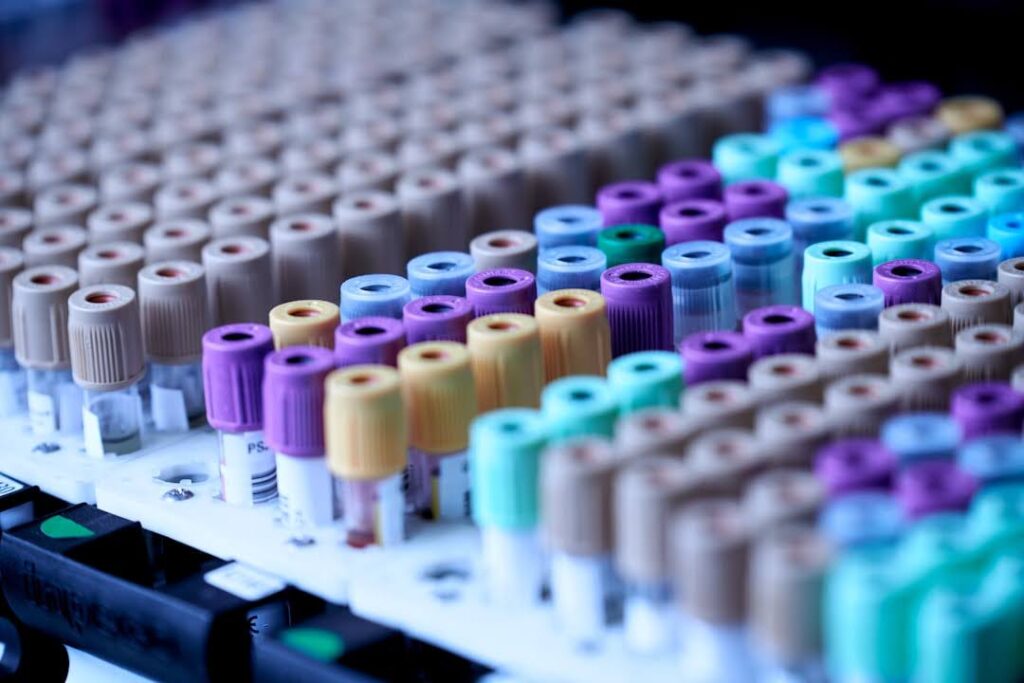
- B12
- Vitamin D
- Fasting Insulin
- Fasting Glucose
- A1c
- CRP
- Lipid Profile
- Thyroid Panel
- Liver Function Tests
Understanding the importance of specific lab tests can illuminate how best to manage PCOS and its associated insulin resistance.
B12: Vitamin B12 is crucial for energy production and neurological function. Deficiencies, often found in those with PCOS, can exacerbate fatigue and other metabolic issues. Women who are prescribed Metformin should be especially concerned with their vitamin B12 levels as this medication will lower B12 over time.
Vitamin D: This vitamin plays a significant role in insulin sensitivity and hormone regulation. Low levels, common in PCOS, can impair glucose metabolism and worsen insulin resistance.
Fasting Insulin: Measuring fasting insulin helps assess insulin resistance, a key factor in PCOS. Elevated fasting insulin levels can indicate that your body is struggling to manage blood sugar effectively.
Fasting Glucose: This test checks for impaired fasting glucose, which can signify prediabetes. It’s a straightforward way to gauge how well your body is handling blood sugar regulation.
A1c: Hemoglobin A1c provides an average of your blood sugar levels over the past three months, offering a comprehensive picture of glucose control. High levels suggest chronic insulin resistance or diabetes.
CRP: C-reactive protein is a marker for inflammation, which is often elevated in PCOS. High levels can indicate chronic low-grade inflammation contributing to insulin resistance.
Lipid Profile: This panel measures cholesterol and triglycerides, vital for understanding cardiovascular risk. PCOS often correlates with unfavorable lipid profiles, increasing the risk of heart disease.
Thyroid Panel: Hypothyroidism is common in women with PCOS and can exacerbate symptoms like weight gain and irregular periods. A thyroid panel ensures that thyroid function is not contributing to metabolic issues.
Liver Function Tests: These tests evaluate liver health, critical in PCOS management. Elevated liver enzymes can signal fatty liver, a condition frequently associated with insulin resistance.
Navigating the complexities of PCOS and insulin resistance can be challenging, but with the right strategies, you can take control of your health. By understanding the relationship between diet, lifestyle, and hormone balance, you can naturally improve your fertility and overall well-being. However, every journey is unique. If you’re looking for personalized guidance, our 1-1 coaching services are here to help.
Our expert coaches specialize in tailoring advice to meet your specific needs, helping you to implement effective changes seamlessly. From customized meal plans to stress management techniques, we offer comprehensive support to ensure you achieve your health goals.
Ready to take the next step? Contact us today and start your journey towards a healthier, more balanced life with our dedicated 1-1 fertility nutrition coaching services.
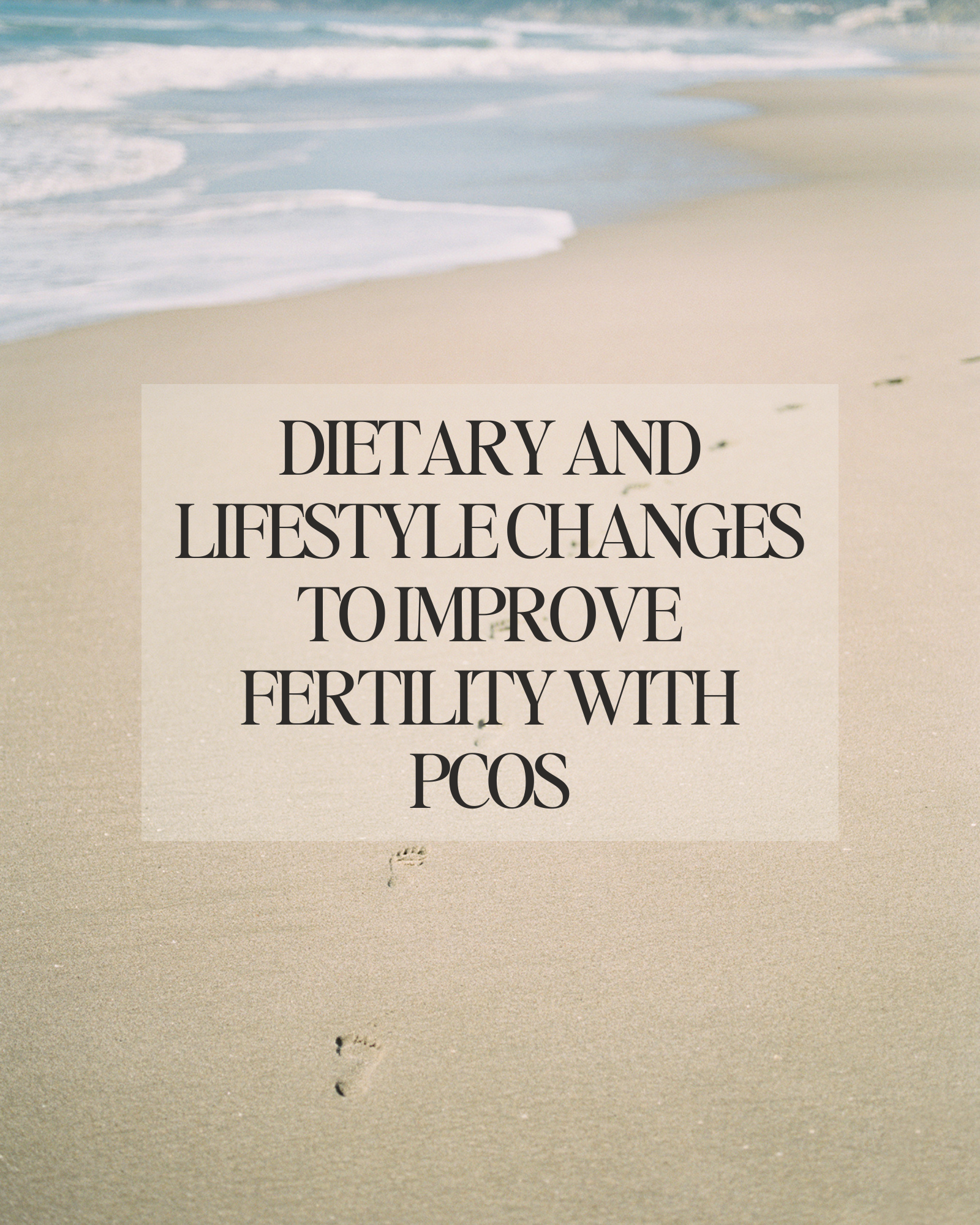
By: Anabelle Harari Clebaner MS, RDN
Diet impacts everything
Want to boost fertility? 🌟 Start with what’s on your plate. Yep, your diet can make a HUGE difference.
When it comes to fertility, adequate nutrition plays a pivotal role. The right nutrients can significantly influence your reproductive health, improving your chances of conception and a healthy pregnancy.
As a fertility dietitian, I know firsthand just how much nutrition makes an impact on your reproductive health, after working with hundreds of women in my private practice, Wellspring Nutrition.
Think of it this way – you have three opportunities every single day to make a healthy choice that nourishes your body for fertility and pregnancy.
So let’s get right into it – here are 5 foods you can start to incorporate or increase in your diet to start to see positive changes in your fertility.
Leafy greens: The superstars 🌿
Spinach, kale, and their leafy friends are packed with folate, iron, and antioxidants.
Folate is essential for: DNA synthesis and repair, embryonic development, and preventing neural tube defects.
Folic acid is crucial for both men and women. For women, it helps create a healthy environment for egg fertilization and early embryonic growth. For men, it supports healthy sperm production.
Iron is essential for: Hemoglobin production and oxygen transport.
Adequate iron levels prevent anemia, which can affect ovulation and overall energy levels, making your body more conducive to conception.
These nutrients are your fertility BFFs. Add them to salads, smoothies, or soups. Easy peasy!
Fatty fish: Omega-3 magic 🐟
We can’t have a conversation about Omega-3 fats without also talking about Omega-6 fats.
Both Omega-3 and Omega-6 fatty acids are essential polyunsaturated fats, meaning your body cannot produce them, and they must be obtained through your diet. Despite being in the same family of fats, they have different roles and effects on the body.
The three most important types are:
– **EPA (Eicosapentaenoic Acid)**: Found in fatty fish such as salmon, mackerel, and sardines. – **DHA (Docosahexaenoic Acid)**: Also found in fatty fish and is a crucial component of brain and eye health.
– **ALA (Alpha-Linolenic Acid)**: Found in plant sources like flaxseeds, chia seeds, and walnuts.
ALA can be converted to EPA and DHA in the body, but this process is relatively inefficient.

Health Benefits
**Anti-Inflammatory**: Omega-3s help reduce inflammation in the body, which can lower the risk of chronic diseases such as heart disease and arthritis. – **Cardiovascular Health**: They are known for their heart-protective effects, reducing blood pressure, and improving cholesterol levels. – **Mental Health**: Omega-3s play a crucial role in brain health and have been linked to reduced symptoms of depression and anxiety. – **Fertility**: As mentioned earlier, they improve egg quality, regulate ovulation, and reduce the risk of endometriosis.
Omega-6 Fatty Acids
Types
The most common type is: – **LA (Linoleic Acid)**: Found in vegetable oils like sunflower, soybean, and corn oil. – **AA (Arachidonic Acid)**: Found in meat and eggs; it is derived from LA. – **GLA (Gamma-Linolenic Acid)**: Found in evening primrose oil and blackcurrant seed oil; it’s a less common omega-6.
Health Benefits
**Pro-Inflammatory and Anti-Inflammatory**: Omega-6 fats can produce both pro-inflammatory and anti-inflammatory compounds. The body’s balance of omega-6 to omega-3 determines the effect. – **Skin Health**: Omega-6 fatty acids can help support skin barrier function and hydration. – **Growth and Development**: Essential for normal growth and brain function, particularly in children.
Key Differences
**Balance and Ratio** – **Ideal Ratio**: Historically, humans consumed Omega-3 and Omega-6 fats in a balanced ratio of about 1:1 to 1:4. However, modern diets tend to have a ratio closer to 1:20 or 1:30, significantly skewed towards Omega-6, leading to an imbalance.
**Health Impact**: An imbalanced ratio (high in Omega-6 and low in Omega-3) can promote inflammation and contribute to chronic diseases. Ensuring an adequate intake of Omega-3s while reducing excessive Omega-6s can optimize health.
Sources
**Omega-3s**: Primarily found in fatty fish (salmon, mackerel, sardines), flaxseeds, chia seeds, walnuts, and algae.
**Omega-6s**: Found mostly in vegetable oils, nuts, seeds, and processed foods. They are more prevalent in the typical Western diet.
While both Omega-3 and Omega-6 fatty acids are essential for health, maintaining a proper balance between them is crucial. Increasing your Omega-3 intake and being mindful of Omega-6 consumption can help in achieving better overall health and reducing the risk of chronic diseases.
Omega-3 Fatty Acids are Essential for: Reducing inflammation, hormone production, and cell membrane function.
Omega-3 fatty acids are known to improve egg quality, regulate ovulation, and reduce the risk of endometriosis. For men, they improve sperm quality and mobility.
So where do you find Omega-3 fatty acids? Salmon, mackerel, and sardines are where it’s at. These fatty fish are fertility wonders. Grill ’em, bake ’em, or toss ’em in a salad. Your future self will thank you.
Nuts and seeds: Tiny powerhouses 🥜
Pumpkin seeds, walnuts, and almonds are considered tiny powerhouses because they are bursting with zinc and selenium. When it comes to fertility, both zinc and selenium play critical roles in ensuring optimal reproductive health. These essential trace minerals are involved in numerous bodily functions, specifically those related to reproductive health for both men and women.

Zinc
Zinc is vital for:
- Hormone Regulation: Zinc helps in regulating hormone levels, particularly testosterone in men and estrogen and progesterone in women. Balanced hormone levels are crucial for a healthy reproductive system.
- Sperm Production and Quality: In men, zinc is essential for spermatogenesis, the process of sperm production. It also enhances sperm motility and morphology, crucial factors for successful fertilization.
- Ovulation: For women, zinc supports the maturation of eggs and ensures regular ovulation, which is essential for conception.
- DNA Synthesis: Zinc is involved in DNA synthesis and cell division, processes that are fundamental during the early stages of fetal development once conception occurs.
Selenium
Selenium contributes to fertility by:
- Antioxidant Support: Selenium acts as a powerful antioxidant, protecting reproductive cells from oxidative stress, which can damage sperm and eggs.
- Thyroid Function: Proper thyroid function, supported by selenium, is crucial for fertility. The thyroid gland regulates many metabolic processes, including those that affect reproductive health.
- Sperm Quality: In men, selenium is essential for the formation and motility of sperm. It helps in maintaining the integrity and function of sperm cells.
- Development: Selenium plays a role in the early stages of embryo development by ensuring proper DNA synthesis and protecting against cellular damage.
Snack on them, throw them in your oatmeal, or mix them in a trail mix – there’s no way to go wrong here! And if you want to learn more about seed cycling, check out this blog right here.
Berries: Antioxidant champs 🍓
Blueberries, strawberries, and raspberries are loaded with antioxidants. These little champs keep your reproductive system in top shape. Enjoy them fresh, frozen, or in a smoothie. Yum!
Antioxidants are compounds that help protect the body from oxidative stress, which is caused by an excess of free radicals—unstable molecules that can damage cells.
Free radicals are naturally produced during metabolism, but environmental factors like pollution, UV exposure, and poor diet can increase their levels.

Berries Images – Free Download on Freepik
Importance of Antioxidants for Fertility
1. **Protecting Reproductive Cells**: Antioxidants help neutralize free radicals, reducing oxidative stress on reproductive cells like sperm and eggs. This protection is crucial for maintaining the health and viability of these cells.
2. **Improving Egg Quality**: Oxidative stress can negatively affect egg quality, leading to issues like chromosomal abnormalities. Antioxidants can improve the quality and viability of eggs by reducing this stress.
3. **Enhancing Sperm Health**: In men, antioxidants play a vital role in protecting sperm from oxidative damage, which can affect sperm count, motility, and overall fertility.
4. **Supporting Hormonal Balance**: Certain antioxidants, like vitamin E and Coenzyme Q10, are involved in hormone production and regulation, which is essential for fertility.
5. **Reducing Inflammation**: Antioxidants like vitamin C, E, and selenium have anti-inflammatory properties, which can help reduce inflammation in the reproductive organs, supporting overall fertility.
Including a variety of antioxidant-rich foods like berries, nuts, seeds, leafy greens, and colorful vegetables can be beneficial for those looking to optimize their fertility.
Eggs: The complete package 🍳
Eggs—especially organic, free-range ones—are amazing. They’re packed with choline and protein, both super important for fertility. Scramble them, poach them, or make a frittata. So versatile!
Eggs are an excellent food for fertility, and one of the key reasons is their high content of choline, an essential nutrient that plays a significant role in reproductive health.

Eggs Pictures [HD] | Download Free Images on Unsplash
Choline and Fertility
1. **Cell Membrane Formation**: Choline is crucial for the formation and maintenance of cell membranes. This is particularly important during pregnancy, as it supports the development of the baby’s brain and nervous system. In the context of fertility, choline ensures the health and integrity of reproductive cells, such as eggs and sperm.
2. **Gene Expression**: Choline is involved in methylation, a process that regulates gene expression. Proper methylation is essential for DNA synthesis and repair, which is vital for healthy cell division and the development of a viable embryo.
3. **Reducing Neural Tube Defects**: Adequate choline intake during pregnancy is associated with a lower risk of neural tube defects in the developing baby. For those trying to conceive, ensuring sufficient choline intake can help prepare the body for a healthy pregnancy.
4. **Supporting Hormone Production**: Choline is a precursor to acetylcholine, a neurotransmitter that plays a role in muscle control and memory but also supports hormone production and regulation. Balanced hormone levels are crucial for ovulation and overall reproductive health.
Other Nutrients in Eggs
In addition to choline, eggs are packed with other nutrients that support fertility:
– **Protein**: Eggs are an excellent source of high-quality protein, essential for the growth and repair of tissues, including reproductive tissues.
– **Healthy Fats**: The healthy fats in eggs, including omega-3 fatty acids, support hormone production and reduce inflammation.
– **Vitamins and Minerals**: Eggs are rich in vitamins like B12, D, and A, as well as minerals like selenium and zinc, all of which play important roles in reproductive health.
Practical Tips
– **Whole Eggs**: Most of the choline in eggs is found in the yolk, so it’s important to consume whole eggs rather than just egg whites.
– **Balanced Diet**: Including eggs as part of a balanced diet can provide a variety of essential nutrients that collectively support fertility. Pairing eggs with other fertility-boosting foods like leafy greens, avocados, and whole grains can further enhance their benefits.
Incorporating eggs into your diet, especially for those looking to boost fertility, is a simple and effective way to ensure you’re getting enough choline and other vital nutrients.
Conclusion: Make it a habit
So, there you have it—the top 15 fertility-boosting foods – phew! That was a lot. Start adding these to your daily meals to reap all the benefits!
And if you’re looking for a super easy way to incorporate these foods, and so many others that are vital for fertility, check out my four-week fertility meal plan.
It was designed to take all of the nutrients important for fertility and translate it into delicious, healthy, and simple recipes to naturally nourish your fertility.
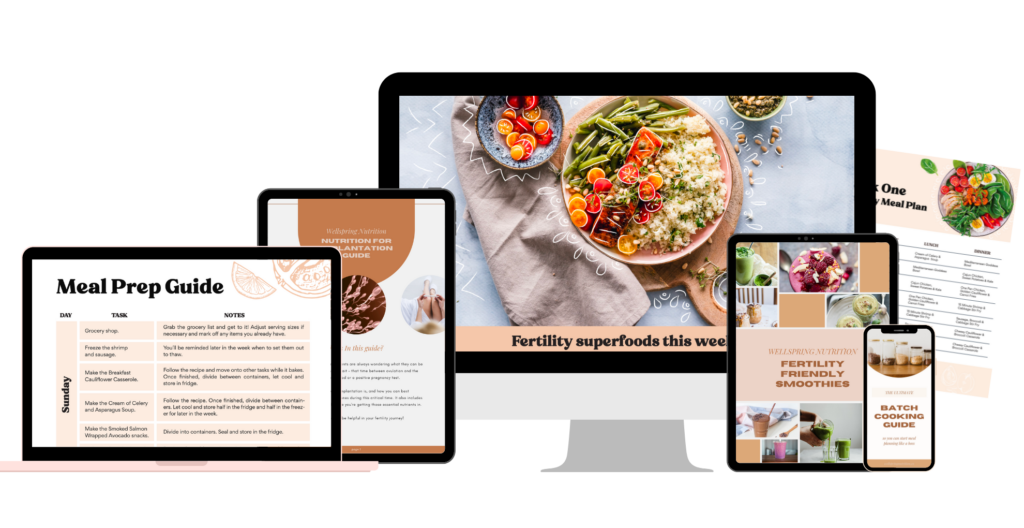
Whether you’re planning your next IUI cycle or are just getting started on your preconception journey, investing in your health is always worth it!
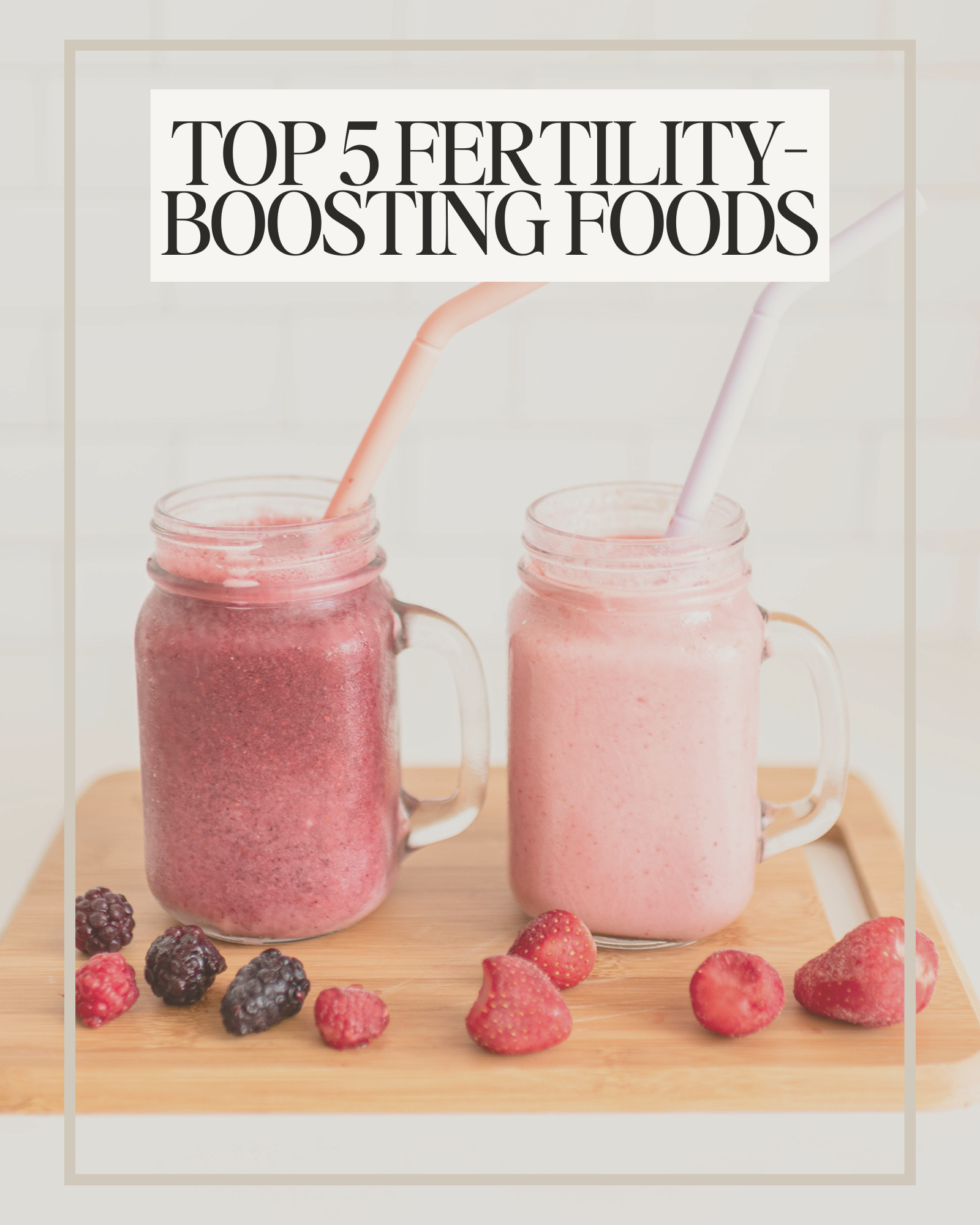
“At no point in human nutrition is it more critical to ensure adequate nutrient intake than during the state of pregnancy”
– Bruce Hollis, PhD
Studies show 95 percent of pregnant women are nutritionally depleted.
Fertility, pregnancy, and postpartum are some of the most physically and mentally demanding times in a woman’s life. Unfortunately, the prenatal vitamin industry is failing women, leaving 95% depleted when nutrition for body and mind is needed most.
Why?
Because most supplement companies follow the current RDAs.
RDAs are based on outdated research methods and studies conducted mainly on white men. In fact, pregnant and breastfeeding women were intentionally excluded from 83% of the studies chosen as the basis for the current perinatal RDAs. Including pregnant and breastfeeding women in clinical research was considered too risky and so these groups were excluded from clinical research under the guise of “protection”.
Ironically, their exclusion ultimately led to misinformed recommendations and a major gap in our collective understanding of women’s bodies, which had a devastating impact on millions of women and their families not set to support the mother in addition to the baby.
Over 630 nutrition studies support the finding that for many nutrients, the current nutritional guidelines for pregnancy and lactation are set well below optimal levels. Take choline as an example. More and more research is showing that the RDA for choline consumption should be much higher than it is to support a baby’s brain development.
Yet 90% or more women aren’t even reaching the current RDA level and most prenatals don’t even include choline in their formulation at all!
Why isn’t this research making its way into the official perinatal nutrition guidelines? On average it takes 17 years for new research to be incorporated. The lag between research and RDAs means women aren’t receiving the optimal support that they so desperately need.
So which 5 key components should you focus on when looking for a prenatal?
- Methylated B Vitamins
- Activate form of vitamin A
- Vitamin D in adequate amounts
- Adequate amount of Choline
- Third-party testing
Methylated Folate and B-Vitamins
When it comes to prenatal supplements, one critical factor to keep in mind is the form of B vitamins they contain, particularly folate. While folic acid is the synthetic form commonly found in many supplements, methylated folate is often the preferred choice. This is because a significant percentage of people have a mutation in the MTHFR gene, which affects their ability to convert folic acid into its active form, folate, that the body can readily use.
Having methylated B vitamins, including methylated folate, in your prenatal supplements ensures that your body gets the essential nutrients it needs without needing to convert them first. This can be incredibly important for preventing neural tube defects and supporting your baby’s growth and development. Moreover, B vitamins in their active, bioavailable forms are more easily absorbed and utilized by the body, providing better overall support during pregnancy.
Therefore, opting for a prenatal vitamin that includes methylated folate rather than standard folic acid can be a game-changer, especially if you have concerns about the MTHFR gene mutation. Always consult with your healthcare provider to choose the prenatal supplement that best meets your individual needs.
Active Vitamin A
When it comes to choosing the right form of Vitamin A in prenatal supplements, you might come across two common forms: retinyl palmitate and beta carotene. Retinyl palmitate is often considered more effective as it is a preformed version of Vitamin A, meaning it is readily usable by your body without the need for conversion. On the other hand, beta carotene, a pro-vitamin A, requires conversion by your body to be utilized. This conversion process can sometimes be less efficient, especially for individuals with certain genetic variations or dietary restrictions. Therefore, retinyl palmitate can offer more reliable and immediate benefits, ensuring that you and your baby receive the requisite amounts of this crucial nutrient.
Activated vitamin A:
- boosts brain development
- enhances immune function
- supports bone formation
Vitamin D and Pregnancy
Vitamin D is a fat-soluble vitamin and hormone. Its major functions include maintaining calcium and phosphorus in the body, regulating 3% of the genome, bone mineralization, blood pressure, mental health, cardiovascular health, neurodevelopment, immune health, and regulating cell growth and differentiation.
How is it made?
When UVB light in the sun interacts with 7-dehydrocholesterol, turning it into vitamin D3. You need adequate sun, and the time of day and year, latitude, sunscreen, clothing, and skin color can all affect vitamin D production.
If you have pale skin, have moderate exposure to sun in a bathing suit can give you 10-25000 IU/day.
Vitamin D3 is metabolized in the liver and converted to 25 (OH)D which is then converted to 1,25 OHD = calcitriol, which is the active form of vitamin D
- 25OH D has a half-life of 2-3 weeks and is an indicator of vitamin D status
- 1,25 OH D has a half-life of 4-16 hours
In pregnancy, the production of calcitriol increases dramatically. The placenta converts vitamin D to its active form (1,25OHD). By 12 weeks, 1,25 OHD serum levels are 2x the level before pregnancy, and it continues to rise reaching 700+ pmol/L (non-pregnant range is 48-120 pmol/L). These levels would be toxic (due to hypercalcemia) normally, but essential during pregnancy.
Over 30 tissues express the vitamin D receptor and are able to respond to 1,25OH D. Adequate 25 OH D directly affects 1,25 OH D levels in pregnancy.
Role of vitamin D in pregnancy:
- Aids in implantation
- Supports fetal growth through the delivery of calcium
- Regulates placental function and placental hormone levels
- Limits production of proinflammatory cytokines (which can impact preeclampsia)
- Involved in the maturation of fetal lungs
- Maintains endothelial integrity/membrane stability
Vitamin D Requirements (highly debated):
IOM: 600 IU /day
RDA: 600 IU/ day
UL: 4000 IU/ day
Endocrine Society: 1500-200 IU/day and UL 10,000 IU
It’s estimated that 20-85% of pregnant women are deficient in vitamin D worldwide. Women of color are at greatest risk because of the melanin – black women 6x more deficient/at risk than white women.
Vitamin D Deficiency:
- Deficiency is even common at latitudes where year-round UVB exposure is expected to be adequate
- Dark skin women in northern latitudes are at higher risk because you need even more time in the sun
- Study of 40 healthy moms in Michigan (42 latitude) took 600 IU daily + 2 cups milk (100 IU/cup)
- Found that at birth 76% of mothers were deficient (>20 ng/ml) and 81% of newborns were deficient
- 600 IU is not enough!
What happens when you’re deficient?
- Increases odds for gestational diabetes, preeclampsia, and preterm birth
- Associated with periodontal disease, postpartum depression, prolonged obstructive labor, recurrent pregnancy loss, C-section
*Always optimal to get levels high before pregnancy!
- Stores of vitamin D in the infant is dependent on maternal vitamin D status.
- 25 OH D passes from the placenta to the fetus
- Maternal 1,25 OH D does NOT cross the placenta, however, the placenta can synthesize 1,25 OHD directly from 25 OHD
- Mother typically maintains higher vitamin D than the baby
Choline
Most women do not consume enough choline in their daily diets and supplementation is high beneficial. Most prenatal vitamins contain too little to be supportive (55mg of Choline or less) as it’s a bulky nutrient that can be difficult to formulate with. Our dose is optimally supportive and safe.
How it supports baby:
- Normal neural tube development
- Optimal brain development, including cognitive performance
- Proper DNA synthesis
- Help mitigate some of the adverse effects of prenatal stress
- Transporting Omega-3 DHA from mom to baby
Third Party Testing
In addition to the forms and amounts of nutrients, we recommend seeking out a prenatal that has third-party testing and is medical grade. When a product is third-party tested, it means it undergoes independent testing by accredited laboratories to verify its purity, potency, and overall quality.
This additional layer of scrutiny provides peace of mind, knowing that your products meet the highest standards of safety and efficacy. Third-party testing is not only important to confirm that what you would expect from the label is actually in your supplement, but also to ensure that there is nothing you would not expect.
Testing for microcontaminants and heavy metals ensures that the product is safe and of the highest quality. We recommend looking for reputable independent third-party certifications such as Clean Label Project, NSF, or USP to help verify product quality.
Additionally, when choosing prenatal supplements, it’s crucial to scrutinize the ingredient list. Opt for products that are free of common allergens like gluten, dairy, and soy, to minimize the risk of adverse reactions. Checking the expiration date on the bottle ensures you’re not consuming a product past its prime, which could compromise its effectiveness.
What’s more, some supplements include herbal ingredients designed to alleviate pregnancy-related ailments. While these can be beneficial, they should be used with caution. Always consult your healthcare provider before adding any herbal supplements to your routine to ensure they are safe for you and your baby.
Remember, a well-rounded prenatal supplement should contain essential nutrients like folate, B12, and chelated minerals in their active, bioavailable forms. These nutrients are crucial for fertility and pregnancy health. For instance, an iron-free formula offers customizability and may be easier on your digestive system, as iron needs can vary among pregnant individuals.
Finally, always keep your doctor informed about any changes to your diet or supplements. This will help them give you the best advice tailored to your specific needs, ensuring a healthy pregnancy journey.
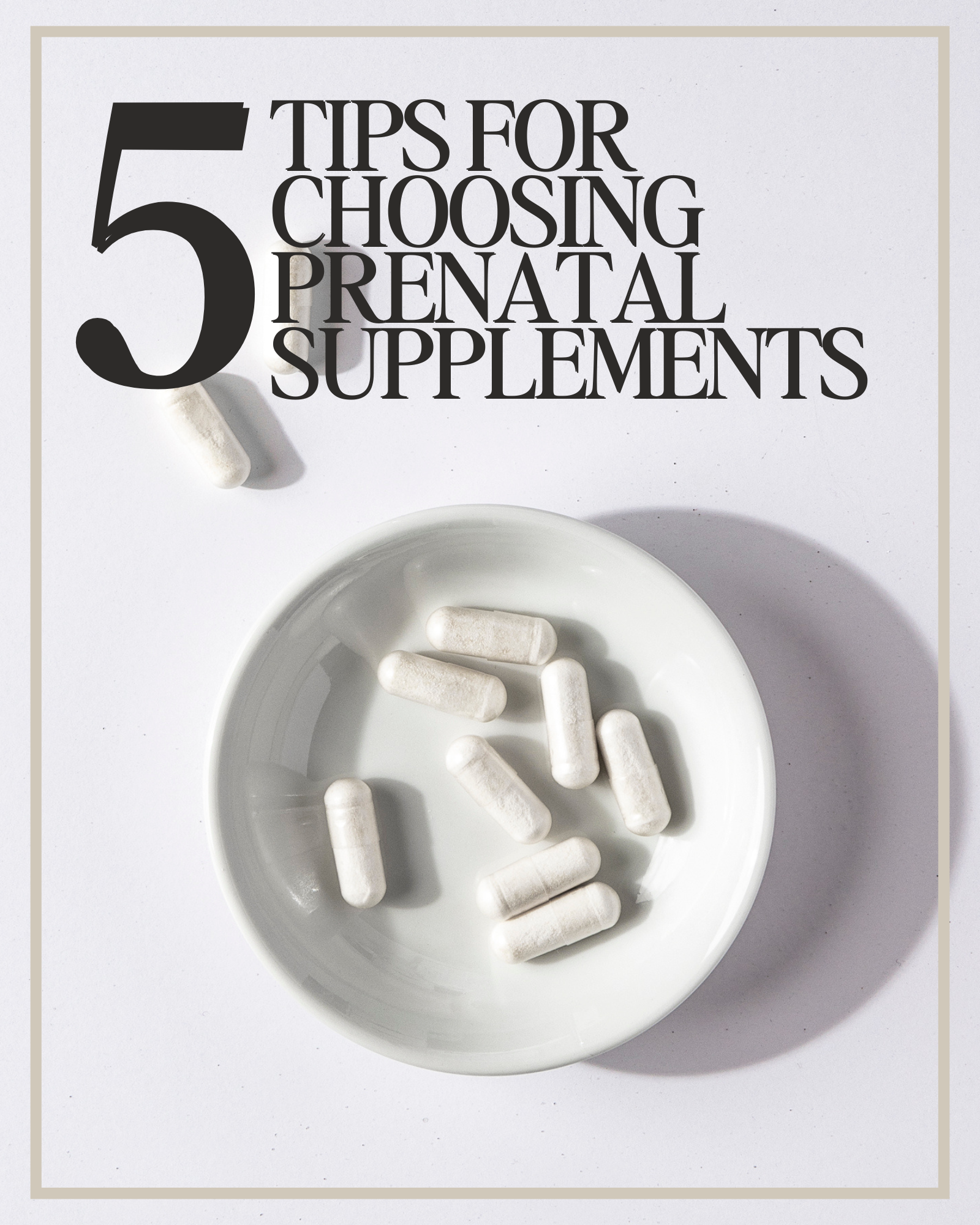
During pregnancy you are likely experiencing a lot of unexpected (and many times uncomfortable) changes to your body. You may be going through heartburn, extreme food aversions, constipation or simply feeling puffy and bloated all over the place. (But not to worry, as these symptoms are very common and natural during pregnancy!)
However, on top of all of this, the anxiety over weight gain may be looming over your head, especially when society holds a certain unrealistic body ideal for women and there is constant pressure to quickly “snap” back in shape postpartum. Afterall, stress is the last thing we want during pregnancy, but there is an unbelievable amount of expectation that goes into carrying another human being, when all we want is to have a healthy baby.
Thus, in today’s article, Wellspring Nutrition is going to help clear up some of the confusion surrounding gestational weight gain to hopefully make your pregnancy journey the healthiest and the most fulfilling.
What is going on in our body?
Gestational weight gain is a natural and healthy aspect of pregnancy as your body is supporting fetal growth and development. Some of you may be wondering why you are gaining weight rather quickly during the early phases of pregnancy when the baby is not even that big. This is due to the fact that during the first 30 weeks, maternal fat stores are increased as the body is actively storing nutrients to meet the demands of growing the placenta, a brand new organ that forms just during pregnancy to sustain the growth of the baby, and the energy needs for later in the pregnancy and lactation. During the later stages of gestation, your body will divert a lot of its nutrients to the developing fetus.
Although total weight gain is variable for each individual, there are certain patterns that are commonly observed. In many cases, the first trimester accounts for 5 percent of the total weight gain and the remaining 95 percent is slowly gained during the last two trimesters.
Overall, aside from the extra fat deposits, the added weight comes from the placenta, the amniotic fluid (the liquid that surrounds the fetus for protection), increase in body water, expanded blood volume, tissue development in the breasts, and uterus and mammary glands amplification. These changes to your body are driven by hormonal shifts to prepare nourishment and a home for your baby!
Why is it important to be conscious?
We acknowledge that any topic surrounding weight, and especially discussing numbers can be extremely triggering for some. There is definitely no merit to obsessing solely over a number on a scale, when you already have a lot going on. Nevertheless, having a general idea of what a healthy pregnancy weight gain should look like is important in preventing certain pregnancy complications as well as for the long term health of you and your baby.
Insufficient gestational weight gain is linked to low birth weight and small-for-gestational-age (SGA) newborns. Babies who were born at a low birth weight are predisposed to cardiovascular and metabolic complications later in life. On the contrary, excessive gestational weight gain leads to a higher likelihood of macrosomia (infants being much larger than average) and large-for-gestational-age (LGA) newborns. These birth outcomes are associated with future obesity, diabetes and cardiovascular disease for the child. Unfortunately, for the mother, excessive weight gain is also considered to be a significant determinant for gestational diabetes and hypertension, labor complications, difficulty with breastfeeding, and even pregnancy loss.
It has been shown that mothers with an accurate knowledge of gestational weight gain recommendation were more likely to meet those targets, indicating that having some level of awareness will lower the likelihood of the mother and the baby to have adverse long-term health outcomes.
How much weight should I be gaining?
As mentioned earlier, there is variability in the total amount of weight gained in pregnancies among different women, and thus there is no uniform approach that is deemed appropriate for everyone. However, there are certain national standards that have been created.
The Institute of Medicine (IOM)’s clinical recommendation range for total weight gain is categorized based on the person’s prepregnancy BMI:
Underweight (BMI of under 18.5): 28 to 40 pounds/ 12.7 to 18.1 kg
Normal Weight (BMI between 18.5 to 24.9): 25 to 35 pounds/ 11.3 to 15.8 kg
Overweight (BMI between 25 to 29.9): 15 to 25 pounds/ 6.8 to 11.3 kg
Obese (BMI over 30): 11-20 pounds/ 4.9 to 9 kg
The BMI scale is undoubtedly not the most reliable way of determining someone’s weight category and its associated health implications, as it fails to discriminate between muscles and fatty tissues. However, it serves as a convenient ballpark estimate to figure out what you should be aiming for.
Moreover, the recommended weight gain is higher if you are carrying twins. The recommendation is 37 to 54 pounds (16.8 kg to 24.5 kg) if you are normal weight, 31 to 50 pounds (14.1 to 22.7 kg) if you are overweight, and 25 to 42 pounds (11.3 to 19.1 kg) if you are considered to be obese in the BMI classification.
It is important to keep in mind that these are standards in the U.S as the IOM (now called the National Academy of Medicine) is an American non-governmental organization. Interestingly, there has not been an international consensus among what is considered to be the “appropriate” range of gestational weight gain. For instance in Japan, where low gestational weight gain is rather common, the recommendation has an upper limit of 12 kg (26.4 pounds) for underweight and normal weight women, and an individualized plan for anyone above those weight classifications. Countries like Ghana, Italy, Canada, Bulgaria, Nicaragua, and Denmark have recommendations that are similar to the U.S IOM specification. Switzerland and Brazil also have identical recommendations to those of the IOM for the underweight, normal weight and overweight category, but have an upper limit of 7 kg (15.4 pounds) for anyone in the obese classification. Furthermore not all countries go by the pre pregnancy BMI category. Some countries in Latin America have recommendations to attain a goal BMI on the basis of gestational age. Other countries have general guidelines that are not based on the mother’s body size or gestational age. Examples include India which has a recommendation of 10 to 12 kg (22 to 26.4 pounds) total weight gain, France which recommends an average total gain of about 12 kg (26.4 pounds) , and Myanmar which recommends an increase of 1 kg (2.2 pounds) a month from the fifth month of gestation to the end of pregnancy.
Thus, you should keep in mind that the IOM recommendation is just one point of reference, and using your best judgment based on your health status or consulting your healthcare provider for your specific circumstance may be beneficial.
It is important to note that for mothers in the overweight or obese category, research indicates that it may actually be beneficial to gain minimal weight or even no weight at all. For overweight and obese mothers, gaining less than the IOM’s recommendation of 15 pounds significantly reduced the risk for preeclampsia, cesarean delivery, and large for gestational age (LGA) infants.
A key takeaway from this article should be to have a general idea of what a healthy weight gain looks like for you individually, but without dwelling too much on the number on the scale and focusing on creating a lifestyle that is healthful to you both physically and mentally. For instance, in terms of food, focusing on the nutrient density in order to nourish your baby instead of overly obsessing on calories intake would go a long way. Please feel free to check out our articles on prenatal nutrition, as they discuss crucial nutrients that are needed during pregnancy!
Additionally, exercise during pregnancy will not only help prevent excessive weight gain but also assist with the alleviation of other pregnancy complications such as gestational diabetes and hypertension, high blood pressure, and edema. It will have a positive impact on your mental wellbeing as exercise can contribute to better sleep as well. There are certain types of exercise that pregnant women are discouraged from taking part in, so make sure to consult with your healthcare provider first.
Looking for more support?
Our fertility dietician Anabelle is available for one-on-one consultation and can help you address any of your concerns regarding fertility, pregnancy or hormonal imbalances like PCOS!
References:
- Aoyama T, Li D, Bay JL. “Weight Gain and Nutrition during Pregnancy: An Analysis of Clinical Practice Guidelines in the Asia-Pacific Region.” Nutrients. 2022 Mar 18;14(6):1288. doi: 10.3390/nu14061288. PMID: 35334946 PMCID: PMC8949332 https://pubmed.ncbi.nlm.nih.gov/35334946/
- Donangelo CM, Bezerra FF. “Pregnancy: Metabolic Adaptations and Nutritional Requirements.” Encyclopedia of Food and Health, (2016): 484-490. https://doi.org/10.1016/B978-0-12-384947-2.00565-1
- Kiel DW, Dodson EA, Artal R, Boehmer TK, Leet TL. “Gestational weight gain and pregnancy outcomes in obese women: how much is enough?” Obstet Gynecol. 2007 Oct;110(4):752-8. doi: 10.1097/01.AOG.0000278819.17190.87. PMID: 17906005 https://pubmed.ncbi.nlm.nih.gov/17906005/
- Lain KY, Catalano PM. “Metabolic changes in pregnancy.”Clin Obstet Gynecol. 2007 Dec;50(4):938-48. doi: 10.1097/GRF.0b013e31815a5494. PMID: 17982337 https://pubmed.ncbi.nlm.nih.gov/17982337/
- Langley-Evans SC, Pearce J, Ellis S. “Overweight, obesity and excessive weight gain in pregnancy as risk factors for adverse pregnancy outcomes: A narrative review.” J Hum Nutr Diet. 2022 Apr;35(2):250-264. doi: 10.1111/jhn.12999. Epub 2022 Mar 20. PMID: 35239212 PMCID: PMC9311414 https://pubmed.ncbi.nlm.nih.gov/35239212/
- Scott C, Andersen CT, Valdez N, Mardones F, Nohr EA, Poston L, Loetscher KC, Abrams B. “No global consensus: a cross-sectional survey of maternal weight policies.” BMC Pregnancy Childbirth. 2014; 14: 167.Published online 2014 May 15. doi:10.1186/1471-2393-14-167 PMCID: PMC4031379 PMID: 24884985 https://www.ncbi.nlm.nih.gov/pmc/articles/PMC4031379/
- Shulman R, Kottke M. “Impact of maternal knowledge of recommended weight gain in pregnancy on gestational weight gain.”Am J Obstet Gynecol. 2016 Jun;214(6):754.e1-7. doi: 10.1016/j.ajog.2016.03.021. Epub 2016 Mar 21. PMID: 27012961 https://pubmed.ncbi.nlm.nih.gov/27012961/
- Smith A, Colleen A, Spees C. “Wardlaw’s Contemporary Nutrition, 12th Edition.” McGraw Hill, 2022.
- “Weight gain during pregnancy.” https://www.acog.org/clinical/clinical-guidance/committee-opinion/articles/2013/01/weight-gain-during-pregnancy#:~:text=For%20twin%20pregnancy%2C%20the%20IOM,42%20lb)%20for%20obese%20women.
- Zhou, M., Peng, X., Yi, H, Tang S, You H. “Determinants of excessive gestational weight gain: a systematic review and meta-analysis.” Arch Public Health. 2022 May 3;80(1):129. doi: 10.1186/s13690-022-00864-9.PMID: 35505415 PMCID: PMC9066815 https://pubmed.ncbi.nlm.nih.gov/35505415/
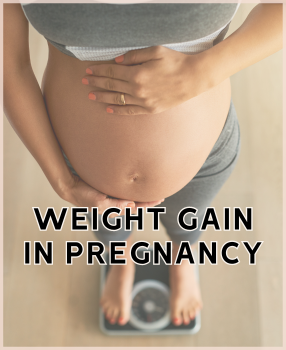
As a pregnant woman, you might be reading up on certain foods to consume during pregnancy to ensure that you are obtaining all the nutrients that are necessary for the healthy development of your baby. At the same time, you might also be feeling terrible about not accomplishing this goal of nourishing your baby due to the food aversion, loss of appetite, and nausea that occurs during pregnancy.
These nausea and vomiting are commonly known as “morning sickness” even though it typically happens any time of the day. You are definitely not alone if you are going through this. It is a common pregnancy experience that approximately 70 to 80 percent of women encounter. Most women experience nausea just during their first trimester although in some cases, it could last longer. By the end of the first trimester, about 60 percent of cases are resolved.
What causes nausea during pregnancy?
Researchers are still not entirely sure what the exact driving force behind this physiological phenomenon is but there are a few compelling theories. One theory points to hormonal factors, specifically that of the placenta, an temporary organ that forms during pregnancy that sustains the growth of the baby. There has been a positive association between the elevated production of human chorionic gonadotropin (hCG), a hormone produced by the placenta and the severity of nausea and vomiting. This hCG may prompt the ovaries to produce more estrogen, and increased estrogen levels are linked to morning sickness symptoms. Additionally, vitamin B deficiency is another potential contributor.
Even though there is no such thing as a fool-proof hack or an absolute preventive action, we have compiled five nutritional tips that may help alleviate your nausea during the first trimester (or really anytime of your pregnancy).
Tip #1: Vitamin B6 consumption
As being deficient in Vitamin B is considered to be one of the risk factors, consuming adequate amounts of vitamin B6 is said to be effective against the incidence of pregnancy nausea and vomiting. Data from randomized trials found an association between vitamin B6 and alleviation of morning sickness. One multivitamin trial found that women who took multivitamins containing vitamin B6 were far less likely to experience nausea and vomiting compared to the placebo group. Furthermore, the American College of Obstetricians and Gynecologists (ACOG) recommends taking a combination of vitamin B6 and doxylamine, as this has been linked to a 70 percent decrease in morning sickness.
Although taking supplements is one way to ensure adequate vitamin B6 intake, there are foods that you can consume that are rich in this nutrient. These include fish (especially tuna and salmon), organ meats like beef liver, chickpeas, potatoes, poultry, bananas and dark leafy greens such as spinach.
Tip #2: Magnesium consumption
Since symptoms of magnesium deficiency include nausea, vomiting, loss of appetite, and fatigue, sufficient magnesium intake may ease your morning sickness symptoms. Magnesium deficiency is common in the United States as the National Health and Nutrition Examination Survey (NHANES) of 2013–2016 found that 48 percent of Americans do not consume adequate amounts of magnesium. Magnesium plays an important role in protein synthesis, functioning of muscles and nerves, and the regulation of blood sugar and blood pressure. Other than potentially alleviating nausea, it is a crucial nutrient during pregnancy as it is shown to reduce pregnancy complications like leg cramps, preeclampsia, gestational diabetes, and hypertension.
Some magnesium rich foods include pumpkin seeds, chia seeds, almonds, green leafy vegetables, cashews, peanuts, and avocados.
Tip #3: Ginger consumption
There has not been much concrete scientific evidence on the viability or the potential harms of many herbal remedies for pregnancy complications. However, ginger has shown clinical significance in terms of management of nausea and vomiting, without much notable side effects and adverse outcomes for the fetus. In a study(randomized trial) that compared a group that took ginger supplements to the placebo group, the ginger group experienced fewer morning sickness symptoms.
Ginger could be in the form of capsules (supplements), ginger tea from freshly grated ginger, or crystalized ginger. For best results you should stick to products that have enough actual ginger.
Tip #4: Probiotics consumption
The “good bacteria” in our body is referred to as probiotics. Pregnancy leads to different types of hormonal changes including the increase in estrogen and progesterone levels. These hormonal changes have an impact on the gut microbiome which can contribute to digestive system-related discomfort like nausea, vomiting, upset-stomach, and constipation. Researchers have found that probiotic supplementation during pregnancy has led to an improved gastrointestinal functioning and significantly reduced nausea and vomiting.
Common foods that probiotics are found in include yogurt, kimchi, miso, kefir, sauerkraut, natto and tempeh. Taking supplements is another option as well- the supplement that was used in the above research mainly consisted of a strain of a beneficial bacteria called Lactobacillus, and had 10 billion live cultures.
Tip #5: Small meals throughout the day
Instead of having 2 to 3 big meals in a day, eating small frequent meals or snacks throughout the day is recommended, along with drinking fluids in between these meals.
Morning sickness can actually get exacerbated when you have an empty stomach, so having some food in your system can ease the symptoms. Thus, neither being too hungry nor being overly full is the key.
Having a low blood sugar level from not eating, or vomiting may lead to a vicious cycle of nauseousness, so maintaining a stable blood sugar throughout the day by having these small regular meals may mitigate the nausea triggers.
Make sure that the foods that you are consuming are protein-rich. Protein stabilizes your blood sugar levels and a study has found that eating a protein-dominated meal led to a reduction in nauseousness compared to a meal with a different macronutrient distribution. Going with bland foods and steering away from spicy and fatty foods can make eating easier as well.
Extra Tip: Don’t be too hard on yourself!
Stress can make your morning sickness worse. We understand how frustrating it is to feel nauseous when all you want to do is to consume nutrient-dense food for your growing baby. It is okay if you are not able to follow the “perfect” prenatal meal plan during this time. When you are going through this state in pregnancy, if you are able to eat something…anythingーeven if it is just a piece of cracker, or a small bite of toast, you should think of it as a win! Your body is doing miracles right now and you should feel comfortable to trust the process. It is not only a temporary occurrence (91 percent of cases of nausea and vomiting are resolved by 20 weeks of gestation), but also, your baby has the ability to delve deep into your reserves to draw nutrition from you in the meantime. Hang in there!
If you feel that the nausea and vomiting is too severe, you may have a condition called hyperemesis gravidarum. It is a separate entity from the standard nausea and vomiting that gets experienced during pregnancy, and you should speak with your healthcare provider immediately if you believe that you might have this.
Looking for more support?
Our fertility dietician Anabelle is available for one-on-one consultation and can help you address any of your concerns regarding fertility, pregnancy or hormonal imbalances like PCOS!
Schedule your appointment today here: https://p.bttr.to/3FdLY5q
Reference:
- “Ginger for morning sickness.” https://healthy.kaiserpermanente.org/health-wellness/health-encyclopedia/he.ginger-for-morning-sickness.tn9125
- “How can I tell if I have low magnesium?” https://www.medicalnewstoday.com/articles/322191
- Lee NM, Saha S. “Nausea and Vomiting of Pregnancy.”Gastroenterol Clin North Am. 2011 Jun; 40(2): 309–vii. doi: 10.1016/j.gtc.2011.03.009 PMID: 21601782 PMCID: PMC3676933 https://www.ncbi.nlm.nih.gov/pmc/articles/PMC3676933/
- “Morning Sickness.” https://www.brighamandwomens.org/obgyn/brigham-obgyn-group/patient-education/morning-sickness#:~:text=Being%20pregnant%20causes%20changes%20in,start%2C%20or%20make%20it%20worse.
- Niebyl JR. “Nausea and Vomiting in Pregnancy.” N Engl J Med 2010; 363:1544-1550 DOI: 10.1056/NEJMcp1003896 https://www.nejm.org/doi/full/10.1056/nejmcp1003896
- “Probiotics improve nausea and vomiting in pregnancy, according to new study.” https://health.ucdavis.edu/news/headlines/probiotics-improve-nausea-and-vomiting-in-pregnancy-according-to-new-study/2021/12
- “Vitamin B6.” https://ods.od.nih.gov/factsheets/VitaminB6-HealthProfessional/#:~:text=The%20richest%20sources%20of%20vitamin,fruit%20(other%20than%20citrus).
- Zarean E, Tarjan A. “Effect of Magnesium Supplement on Pregnancy Outcomes: A Randomized Control Trial.”Adv Biomed Res. 2017 Aug 31:6:109. doi: 10.4103/2277-9175.213879. PMID: 28904937 PMCID: PMC5590399 https://pubmed.ncbi.nlm.nih.gov/28904937/

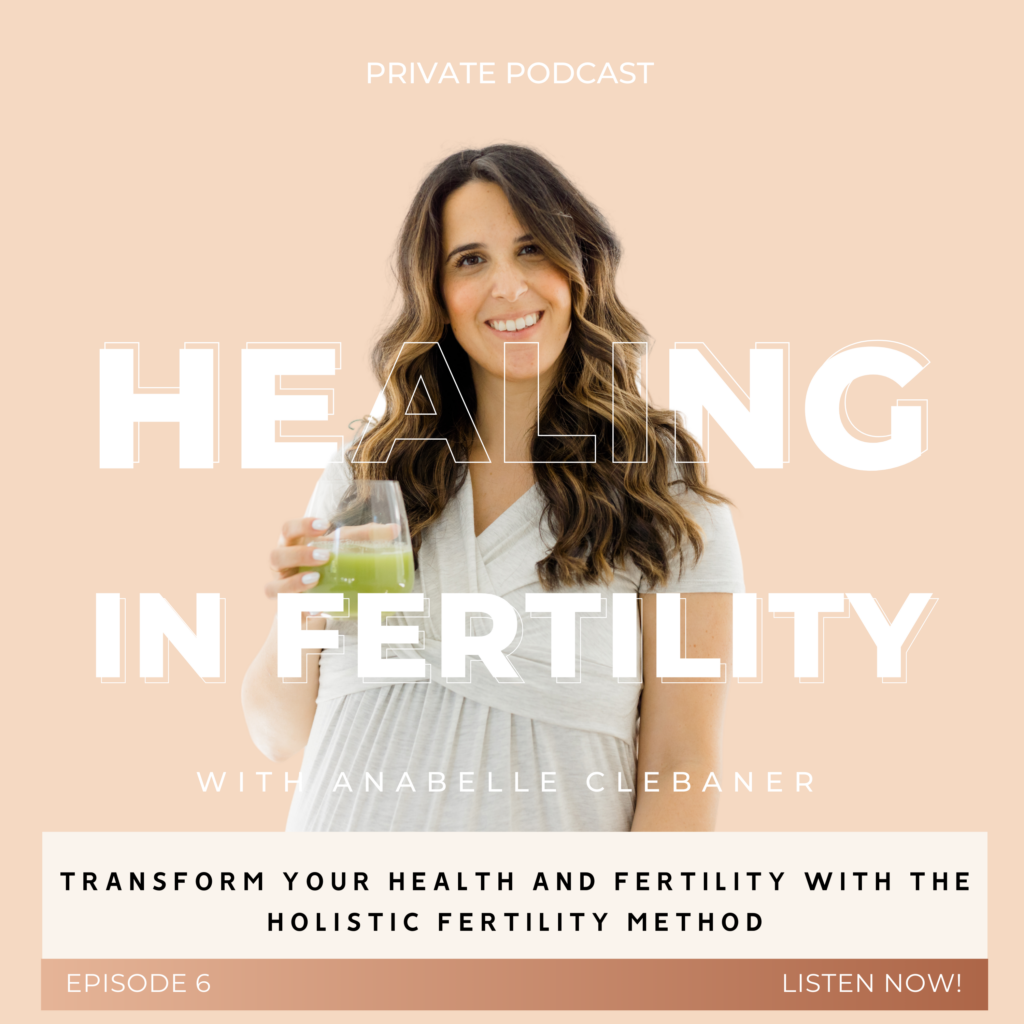
If you want to listen to the full episode head over to: www.wellspringnutrition.co/healing-in-fertility
Transcript:
Hello. Welcome back to the very last episode in this mini podcast series. I’m so happy you’ve stuck with me this whole time. So far, we’ve talked about the different reasons that you might be struggling with trying to conceive things that you have thought were working but probably are hurting you or not really doing anything. We talked about different functional lab tests and how that can really accelerate your fertility timeline. We also talked about different diets for fertility and what is truly needed to achieve your pregnancy goals. And in the very last episode, we heard from one of my past clients, Amanda, who told you all about her experience working with me and using functional nutrition for fertility. So in this last episode, I’m really going to recap.
The Holistic Fertility Method
So in this last episode, I actually want to introduce you into my program called the Holistic Fertility Method. This is a four month group coaching program, and I want to tell you all about it because I know that it’s going to help you so much. The program really has four different phases. So in the first month, we’re really focused on your fertility diet. We focus on blood sugar management and even send you your own continuous glucose monitor so that you can see exactly how the foods that you’re eating are impacting your blood sugar levels throughout the day. This has been so helpful for so many clients and really helps you connect exactly what you’re eating, how you’re moving, and how that impacts blood sugar. We already talked about how much blood sugar impacts ovulation, egg quality, all of those things. And so that is why we focus the first month dialing in your blood sugar completely the second month and the third month, we dive more into the functional labs.
So we include a GI Map stool test and an HtMa, the hair tissue mineral analysis inside the program price. So you’re getting these two different labs, and once we have your lab results back, you get a personalized, tailored protocol based on your lab. So whether you’re dealing with digestive issues, low energy acne, hormone imbalances, these two labs are really what I start every client on because they can give us so much detailed information to start getting you wins really fast. So that’s happening in month two and month three, and the last month is really to give you that time to integrate everything altogether. We include weekly education modules, so in between our monthly group coaching calls, you have access to weekly modules that go through fertility, nutrition, egg quality, ovulation, sperm quality, detoxing, environmental toxins. So much education is put in there because I know that from personal experience, when I understand the why behind something, I’m more likely to do it. So not only are we giving you the lab test, the continuous glucose monitor, the education, but we’re also having monthly coaching calls where you can ask your questions, you get the support, and you also get the support of everyone else inside of the community. We also include monthly guest experts.
So we actually just had our first guest expert last week where she led us through Yoga nidra and every month is a different theme or a different person that’s meant to help support nervous system regulation. We talked a lot about in this podcast how stress can impact your fertility. And that is something that I know I have experienced, I know so many of my clients have experienced, and really giving you all of the support that you could possibly need inside this container was my goal for creating the Holistic fertility method. So at this point, you’re probably really excited about it and maybe you’re wondering, is it worth it? We talked about how IVF can sometimes feel like it’s a guarantee when in fact it’s really not a guarantee. It costs tens of thousands of dollars. It includes a variety of different hormones and medications and procedures and is really intensive not only financially, but physically, mentally and emotionally. And I want to say and I want to tell you that IVF is not your only option. Obviously I would never tell you that I can guarantee that you get pregnant, not or the best IVF doctor in the world couldn’t promise you that either.
Prioritize Your Health: Accelerate Fertility and Enhance IVF Outcomes
But I will say that by investing in your health in this way, you are going to not only accelerate your fertility timeline, but in the situation, if you do need IVF, you’re going to set yourself up for such a better outcome. If you are someone that values personalized care and personalized nutrition, then this service is for you. If you value a great experience and you want a health practitioner that is communicative, attentive and looking out for your best interests, then this program is for you. If you value quality and attention to detail, this service is for you. And if you value putting yourself first and prioritizing your health as the mother, then this program and this service is for you. 95% of our clients report that their investment was worthwhile. And I share this stat really proudly because I care so deeply about our clients, not just their health outcomes, but also who they are and what they value and what their dreams are and how they show up for themselves. And as mothers, I’ve worked with women across the health spectrum.
Women who have polycystic ovarian syndrome, women who have women who have endometriosis, women who have unexplained infertility, women who have had previous miscarriages. Women who have never gotten pregnant, people who women who have had failed IVF cycles, women who have irregular periods or very painful periods, women who have hypothyroid, women who have graves disease. You name it. I’ve worked with someone who’s in the exact same situation that you are in right in this very moment. So if you’ve binged these episodes, I want you to take a moment right now and just imagine your life six months from now? What would that look like if you made the decision to join the Holistic Fertility Method today? Just imagine for a second feel those feelings and saying yes to your health, to your fertility. What would it look like? Try to bring that picture into your mind right now and not just what this is going to do for you, but how it’s going to impact everyone around you as well. What are you telling yourself six months from now? Are you so proud of yourself? Are you celebrating yourself for putting yourself first? How has your life changed? How has your health changed? I want you to notice and think about and really envision this life and who you are and who you have become as part of this processed. If you’ve binged these episodes, you listen to our stories and you’re going back and forth on whether or not you should move forward, I think that’s an excellent sign.
Chances are you’re going back and forth because you know there’s a need for this program and for this service in your life right now. And I want to tell you that there is a special bonus available to you specifically from coming from the podcast. So if you pause this episode, you go to the link in the show notes, go to Wellspringnutrition co HFM. You can enter the code podcastfertility and that will get you a special bonus on the program, the Holistic Fertility method and our next cohort will be in a few months. But the difference between joining now or later is just making that decision to start right now. So as soon as you sign up, you will get your continuous glucose monitor and your lab work sent to you so that you can actually do those labs and have it sent back and have it all ready to go by the time day one of the program starts. So just head to the website, head to the link in Bio. You’ll see when the next live cohort will begin.
But you can actually get started and put your deposit down today. So if you’ve been waiting for a sign to finally get in control of your health and your fertility and make the decision to invest in your own health, then this is the sign that you’ve been waiting for. It’s all possible and it’s all here for you. And you are so worthy and deserving of this. You’re worthy and deserving of feeling your absolute best and feeling nourished and whole prior to pregnancy, during pregnancy, and especially after pregnancy as a mother. So if you’ve enjoyed this podcast series, I want to thank you so much for listening, for taking your time to hear more about what I do. And I can’t wait to see your name inside the Holistic Fertility method. If you have any questions you’re thinking about, it, definitely reach out to me on Instagram and we can chat more about it.
But you can just head to Wellspringnutrition.co HFM and put your deposit in for the next live Cohort. Get everything ready and started. Today is the day. Thank you so much for listening. Bye. Thank you so much for listening. It’s been an absolute pleasure recording this podcast, and I can’t wait to hear your feedback, and I can’t wait to connect with you more inside of the program. Bye.
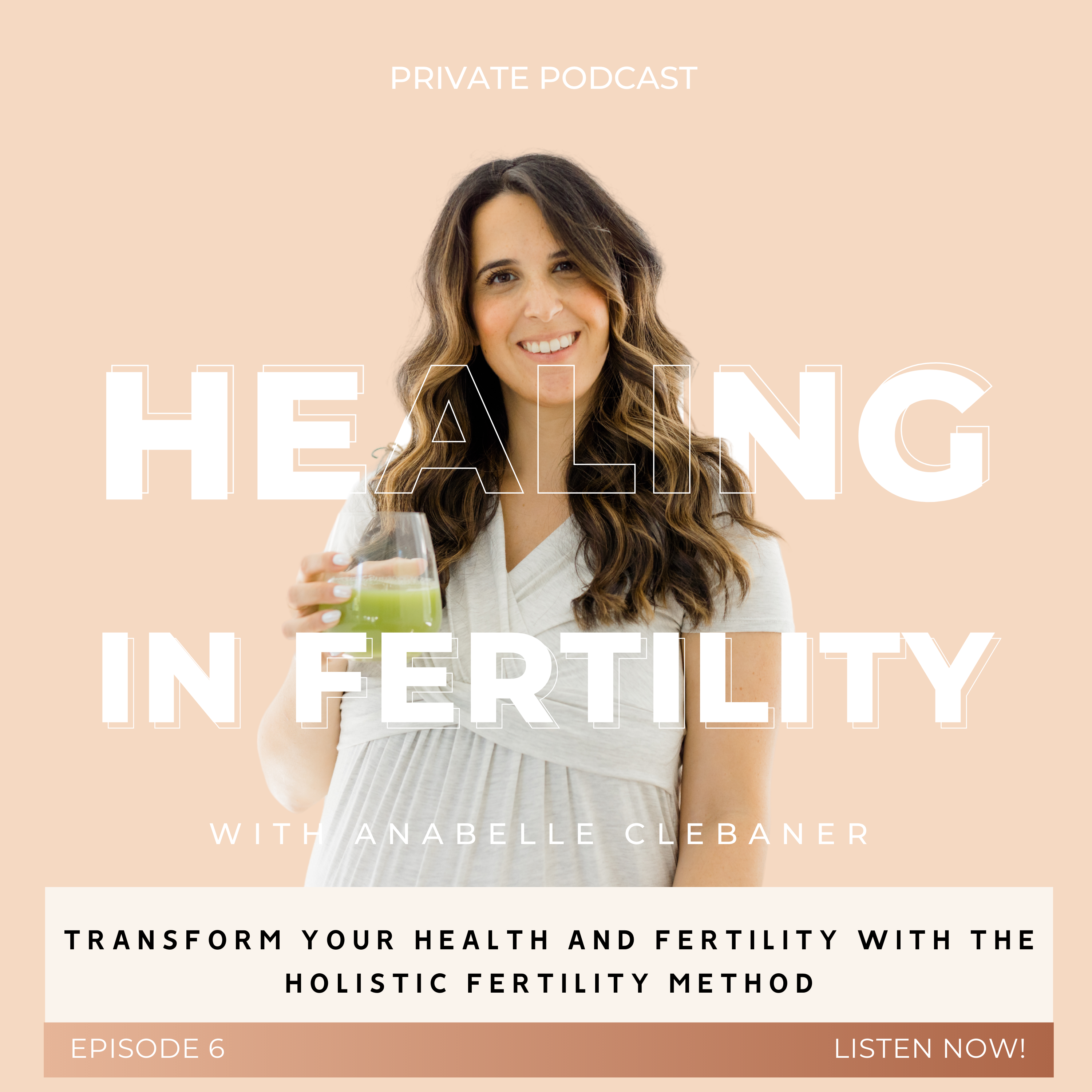
The Preconception Playbook
This free playbook provides specific actionable tips to get started on your fertility journey, as well as what to avoid while you're trying to conceive.
Get the free playbook

